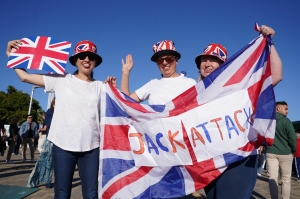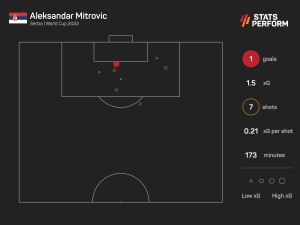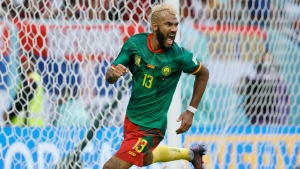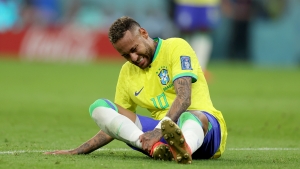France, Brazil and Portugal are the only sides to have already secured World Cup knockout football, with numerous teams facing a nervy final matchday as they bid to reach the round of 16 in Qatar.
Pre-tournament favourites Brazil breezed through Group G with wins over Serbia and Switzerland, while France became the first reigning world champions to escape the group stage since the Selecao in 2006.
Portugal made sure of their round-of-16 spot after Monday's Group H victory over Uruguay, yet the likes of England, Spain, Germany and Argentina all need results on matchday three to progress.
The Netherlands are another big name that have yet to confirm their place in the latter stages of FIFA's top tournament, while Belgium face a tense Group F clash with Croatia to avoid an early exit.
Here, Stats Perform takes a look at the permutations riding on the final selection of group-stage action in the Middle East.
Group A
The Netherlands are largely in control of Group A, needing to just avoid defeat against the already eliminated hosts, Qatar.
Louis van Gaal's side will also reach the round of 16 if Ecuador beat Senegal, who have to win otherwise Aliou Cisse's side will rely on a somewhat unlikely win for Qatar over the Netherlands to remain in contention.
Ecuador, who have impressed in their first two games, must win or draw against Senegal to progress. However, Gustavo Alfaro's men could go through in defeat if Qatar beat the Netherlands.
Group B
A win or a draw is enough for England against fierce rivals Wales. Yet, the Three Lions would still progress as long as they avoid a four-goal defeat against Wales, whose goal difference is six fewer.
Iran are guaranteed to qualify with victory over the United States, who know anything other than a win against Carlos Queiroz's side will see them eliminated from the competition.
Quieroz's men could still escape Group B with a draw, though goal difference would come into play if Wales pick up their first win at the tournament against Gareth Southgate's England.
Group C
All four teams can still make it out of an enticing Group C, with Argentina – who were among the pre-tournament favourites – needing to beat Poland to guarantee a round-of-16 place.
La Albiceleste could progress with a draw, however, and would be through in that instance if Mexico and Saudi Arabia also share the spoils.
Yet, if Lionel Scaloni's men are held and Herve Renard's men beat El Tri, Argentina will be eliminated. If Mexico win and Argentina draw, it goes to goal difference.
Poland would go through by avoiding defeat, but would be knocked out by a loss coupled with a Saudi Arabia victory over Mexico, who must win to have any chance of remaining in the tournament.
If Poland lose and Saudi Arabia draw, the two teams will have to be separated by goal difference, which will also be used if Czeslaw Michniewicz's side are defeated and Mexico win.
Group D
France are already in the round-of-16 draw and will top Group D as long as they do not lose to Tunisia and Australia do not defeat Denmark, otherwise the Socceroos would move level on six points with Les Bleus.
While victory would take Australia through, Graham Arnold's side would still reach the knockout stage with a draw unless Tunisia beat France, which would see Jalel Kadri's men progress on goal difference.
Denmark would grab qualification with a win over Australia unless Tunisia triumph over France, which would leave goal difference or goals scored to separate the Carthage Eagles and Kasper Hjulmand's men.
Group E
Spain are the favourites to progress from Group E, requiring a win or draw against Japan. Defeat would see Luis Enrique's side still go through on goal difference, unless Germany lose to Costa Rica.
Germany must pick up three points to stay in contention and would qualify as long as Spain defeat Japan, though a draw in the latter game or a win for Hajime Moriyasu's men would see goal difference needed.
A win for Japan over Spain would take Moriyasu's side through, while a draw – coupled with a stalemate for Germany – would also see the Samurai Blue make the knockout stage.
Costa Rica would earn a last-16 spot with victory and a point would also take them through if Spain overcome Japan. A draw in both games or a defeat for Fernando Suarez's side sees them eliminated.
Group F
Croatia will pass through Group F if they avoid defeat against Belgium, who require victory against the 2018 runners-up to guarantee a place in the round of 16.
Such a win for Belgium would leave Croatia needing already eliminated Canada to overcome Morocco, with goal difference coming into play to separate Zlatko Dalic's side from the Atlas Lions.
A draw is likely not enough for Belgium. They would need Morocco to lose to Canada and then rely on goal difference, though Walid Regragui's men (+2) hold the advantage over Roberto Martinez's side (-1) in the decisive metric.
Morocco would progress with victory over Canada, while a defeat would see Regragui's side reliant on Belgium beating Croatia for goal difference to be decisive between Dalic's men and the Atlas Lions for second.
Group G
Brazil have secured knockout football and will finish as Group G winners with anything other than defeat against Cameroon, who need victory against Tite's side and results to go their way to make the last 16.
Rigobert Song's men would be eliminated if they do not win, though victory is not guaranteed to secure progression as Switzerland could play out a high-scoring draw with Serbia to go through on goals scored, which is used if sides cannot be separated on goal difference – Cameroon are currently on -1 and Switzerland level in the latter metric.
The somewhat expected scenario of Cameroon losing to Brazil would see Serbia and Switzerland become a winner-takes-all clash.
Dragan Stojkovic's side need victory to progress in that instance, while a draw would be enough for Switzerland. Goal difference would be required if Serbia (-2) and Cameroon (-1) both win their final encounters.
Group H
Portugal are already through and would top Group H by avoiding defeat against South Korea, who could still make a late charge for the round-of-16 stage should the result between Uruguay and Ghana go their way.
The permutations are straightforward for Uruguay and South Korea, who must win to avoid elimination, though qualification is not assured even with victory.
Both teams would be level on four points with victories, again leading to goal difference to separate. Yet, if Ghana beat Uruguay then South Korea's result against Portugal will prove irrelevant for Paulo Bento's side.
A draw for Ghana and a win for South Korea would also see goal difference required to split the two sides, with Bento's men trailing the Black Stars by one in that metric, which could mean goals scored comes into it.









































